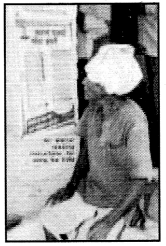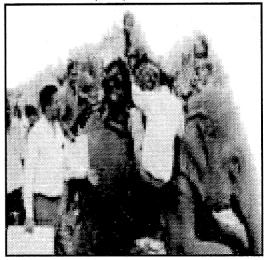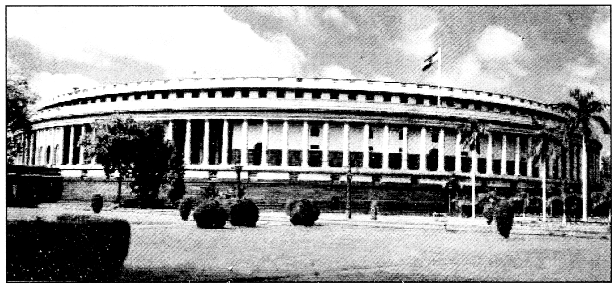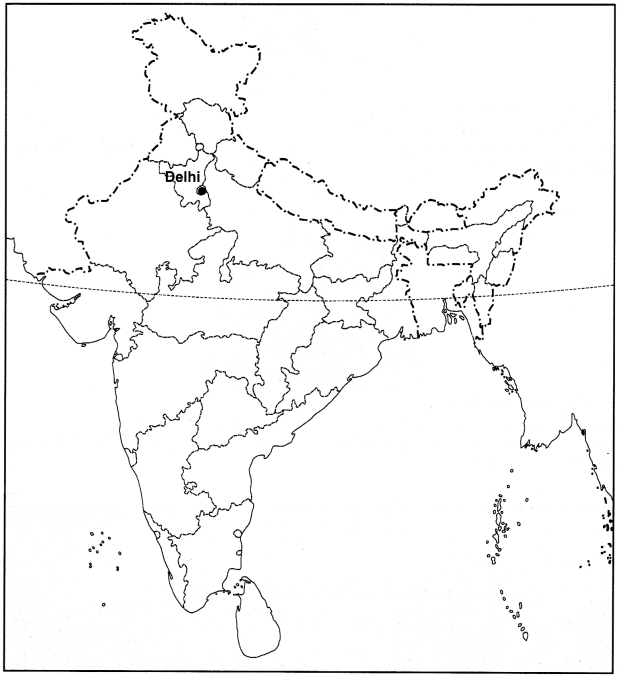Why Do We Need a Parliament Class 8 Civics Chapter 3 Extra Questions and Answers Social Science CBSE Pdf free download are part of Extra Questions for Class 8 Social Science. Here we have given NCERT Extra Questions for Class 8 Social Science SST Civics Chapter 3 Why Do We Need a Parliament.
You can also practice NCERT Solutions for Class 8 Civics Chapter 3 Questions and Answers on LearnInsta.com.
Class 8 Civics Chapter 3 Extra Questions and Answers Why Do We Need a Parliament
Why Do We Need a Parliament Class 8 Extra Questions and Answer Civics Chapter 3 Very Short Answers Type
Question 1.
When did India become independent?
Answer:
On 15th August 1947.
Question 2.
Which is the most important symbol of Indian democracy and a key feature of the Constitution?
Answer:
The Parliament is an important symbol and key feature of Indian democracy.
Question 3.
What is Universal Adult Franchise?
Answer:
It means that all Adult Citizens of the country have the right to vote.
Question 4.
In how many years is the Lok Sabha elected?
Answer:
Once in every 5 years.
Question 5.
How many elected members are there in Lok Sabha?
Answer:
543 elected members.
Question 6.
Who selects ministers to work with him/her to implement decisions?
Answer:
The Prime Minister selects ministers.
Question 7.
Which is the very important way through which the Parliament controls the executive? Answer:
During Question Hour MPs can elicit information about the working of the government.
Question 8.
How are the marginalized given adequate representation?
Answer:
By reserving the seats in the Parliament, the marginalized are given adequate representation.
Question 9.
What does the term coalition means in general?
Answer:
Coalition is a temporary alliance of groups of parties.
Question 10.
How many elected and nominated members are there in Rajya Sabha?
Answer:
There are 233 elected and 12 nominated members in Rajya Sabha.
Question 11.
What does the Parliament enables the citizen of India to?
Answer:
Parliament enables citizens of India to participate in decision making and control the govt.
Question 12.
What is considered as the most important symbol of the Indian democracy?
Answer:
Parliament is the most important symbol of Indian democracy.
Question 13.
Which act was seen as the graye danger during British rule in India?
Answer:
Criticising the British government was a grave danger at that time.
Question 14.
Which act allowed some elected representation?
Answer:
Govt of India Act 1909, allowed for some elected representation.
Question 15.
How can we say that Parliament in our system has immense powers?
Answer:
Parliament in our system has immense powers because it is the representative of the people.
Question 16.
Who together make’s up the Parliament?
Answer:
The MP’s together makes up the Parliament.
Question 17.
What all does the Parliament consists of in India?
Answer:
Parliament consists of the President, Rajya Sabha and Lok Sabha in India.
Question 18.
What is the main eligibility for the political party to form the govt.?
Answer:
They must have majority of elected MP’s.
Question 19.
What is one of the most important functions of the Lok Sabha?
Answer:
One of the most important functions of the Lok Sabha is to select the executive.
Question 20.
Define the term Approval.
Answer:
It meant to give one’s consent to and be favorable towards something.
Why Do We Need a Parliament Class 8 Extra Questions and Answer Civics Chapter 3 Short Answers Type
Question 1.
Define the term ‘Approval’ in the context of this chapter and in general.
Answer:
Approval means to give one’s consent to and be favorable towards something. In the context of this chapter, it refers to the formal consent (through elected representatives) that Parliament has as well as the fact that it needs to continue to enjoy the people’s trust.
Question 2.
How are the marginalized group of people get an adequate representation in Parliament and how does Parliament now have more and more people from different backgrounds?
Answer:
The Parliament now has more and more people from different backgrounds. For eg. there are more rural members and also members from many regional parties. Groups and people that were non-unrepresented are beginning to get elected to the Parliament. There has also been an increase in political participation from the Dalit and backward castes and the minorities. It has been observed that representative democracy cannot produce a perfect reflection of society.
There is a realization that when interests and experiences separate us it is important to ensure that communities that have been historically marginalized are given adequate representation. With this mindset, some seats are reserved in the Parliament for SCs and STs. This has been done so that MPs elected from these constituencies will be familiar with and can represent Dalit and Adivasi interests in the Parliament.
Question 3.
Briefly describe the function Rajya Sabha in the working of the Parliament?
Answer:
The Rajya Sabha functions primarily as the representative of the States of India in the Parliament. The Rajya Sabha can also civiliate legislation and a bill is required to pass through the Rajya Sabha in order to become a law. It, therefore has an important role to reviewing and altering (if needed) the laws initiated by the Lok Sabha.
The members of the Rajya Sabha are elected by the elected members of the Legislative Assembles of various States. There are 233 elected plus 12 nominated members in Rajya Sabha among them 12 are nominated by the President.
Question 4.
Which is one of the most important functions of the Lok Sabha? Who are the executives?
Answer:
One of the most important functions of the Lok Sabha is to select the executive. The executive is a group of persons who work together to implement the laws made by Parliament. This executive is often what we have in mind when use the term Government.
Question 5.
Who is the Prime Minister in India and what is the prime function of ministers selected by him from his party?
Answer:
The Prime Minister of India is the leader of the ruling party in the Lok Sabha. From the MPs, who belong to his party, the Prime Minister selects ministers to work with him to implement decisions. These ministers take charge of different areas of government functioning like health, education, finance, etc.
Why Do We Need a Parliament Class 8 Extra Questions and Answer Civics Chapter 3 Long Answers Type
Question 1.
How does the Parliament control, guide and inform the government?
Answer:
The Parliament while in session, begins with a question hour. The question hour is an important mechanism through which MPs can elicit information about the working of the government. This is a very important way through which the Parliament controls the executive.
By asking questions the government is alerted to its shortcomings, and also comes to know the opinion of the people through their representatives in the Parliament i.e. the MPs. Asking questions is a crucial task for every MP.
Opposition parties play a critical role in the healthy functioning of a democracy. They highlight drawbacks in various policies and programmes of the government and mobilise popular support for their own policies. The government gets valuable feedback and is kept on its toes by the questions asked by the MPs.
In addition, in all matters dealing with finances, Parliaments’ approval is crucial for the government. This is one of the several ways in which the Parliament controls, guides, and informs the government.
The MPs are representatives of the people and have a central role in controlling guiding and informing the Parliament and this is a key aspect of the functioning of Indian democracy.
Question 2.
How is the National government selected and how does the Parliament perform this function of selecting the National government?
Answer:
The Parliament in India consists of the President, the Rajya Sabha and the Lok Sabha. After the Lok Sabha elections, a list is prepared showing how many MPs belong to each political party. For a political party to form the government, they must have a majority of the elected MPs.
Since there are 543 elected and nominated members in the Lok Sabha, to have a majority a party should have at least half the number, i.e., 272 members or more. The Opposition in Parliament is formed by all the political parties that oppose the majority party/coalition formed. The largest among these parties is called the Opposition party.
One of the most important functions of the Lok Sabha is to select the executive. They are the groups of persons who work together to implement the laws made by the Parliament. The Prime Minister is the leader of the ruling party in the Lok Sabha. From the MPs belonging to his party, the Prime Minister selects ministers to work with and to implement decisions.
The ministers then take up the charge of different areas of government functioning. Often when the single party does not get majority the different parties which are interested in similar concerns join and form a coalition government.
The Rajya Sabha functions primarily as the representative of the states of India in the Parliament. The Rajya Sabha can also initiate legislation and a bill is required to pass through the Rajya Sabha in order to become a law. It, therefore, has an important role of reviewing and altering the laws initiated by the Lok Sabha.
The members of the R.S. are elected by the elected members of the Legislative Assemblies of various States. There are 233 elected members plus 12 members nominated by the President.
Picture Based Questions Class 8 Civics Chapter 3 Why Do We Need a Parliament
Look at the picture given below and answer the following questions:

Question:
1. What does the picture show?
2. Around how much trees were saved after the use of EVM’s in 2004?
Answer:
1. It shows voter reading instructions on how to use an EVM (i.e. Electronic Voting Machine).
2. The use of EVM in 2004 saved around 1,50,000 trees.

1. What does the picture show?
2. Is it that much necessary to carry polling material in such conditions?
Answer:
1. It shows the election staff using an elephant to carry polling material and EVM’s to polling stations located in difficult terrain.
2. Yes.

1. What does the picture show?
2. Which is known as the supreme law-making institution?
3. How many houses are there in the Parliament? Name them.
Answer:
1. The picture shows the Parliament of India (Sansal).
2. The Parliament of India (Sansad) is the supreme law-making institution.
3. It has 2 houses
- The Rajya Sabha
- The Lok Sabha.
Map-Based Questions Class 8 Civics Chapter 3 Why Do We Need a Parliament
Look at the map given below and answer the following Questions
Question 1.
On an outline Map of India shows the following:
- The state where your currently live and from where your known to had elected there Parliamentary representatives.
- Represent the state where the prime minister office (PMO) is situated.
Answer:
Delhi
